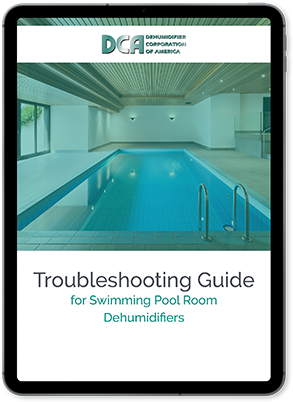Industries that demand year-round strict control of moisture rely on dedicated dehumidification systems. These systems offer the ability to strictly control relative humidity limiting the effects of condensation, mold and mildew that may damage materials or products.
Indoor pools add value and year-round enjoyment to your property, whether you have one in your hotel, gym, spa, or private residence. Maintaining appropriate water temperature is critical to continued pool satisfaction. Most indoor pool operators heat pool water 2–4°F below the pool room’s air temperature to minimize and control evaporation. They are increasingly using this to their advantage by installing dehumidifiers that channel heat from the refrigeration cycle back into the pool room in the form of space heating or assist in pool water heating.
 Controlling the relative indoor humidity in your fitness center will reduce mold and bacteria buildup and produce happy patrons. Without dehumidification systems leading to unacceptable indoor air quality, these facilities tend to get grim pretty fast—when not controlled, moisture buildup from patron sweat results in foul odors, shorter equipment lifespans, and the proliferation of diseases.
Controlling the relative indoor humidity in your fitness center will reduce mold and bacteria buildup and produce happy patrons. Without dehumidification systems leading to unacceptable indoor air quality, these facilities tend to get grim pretty fast—when not controlled, moisture buildup from patron sweat results in foul odors, shorter equipment lifespans, and the proliferation of diseases.
The presence of moisture and humidity in any part of the food production cycle can mean the difference between a product being safe and fresh versus unsafe and spoiled. Moisture often leads to the growth of bacteria, mildew, or mold. Condensation on cold products also creates moisture risks when storing food. Fortunately, these risks can be easily mitigated by using temperature control technology and dehumidification systems.
To manage humidity, mold and mildew, dehumidifiers are a critical tool responsible for enhancing a space’s comfort, function, and overall operation. In large scale commercial and industrial spaces, consistent ventilation, moisture management, and desired room air temperature pose a particularly complex challenge.



